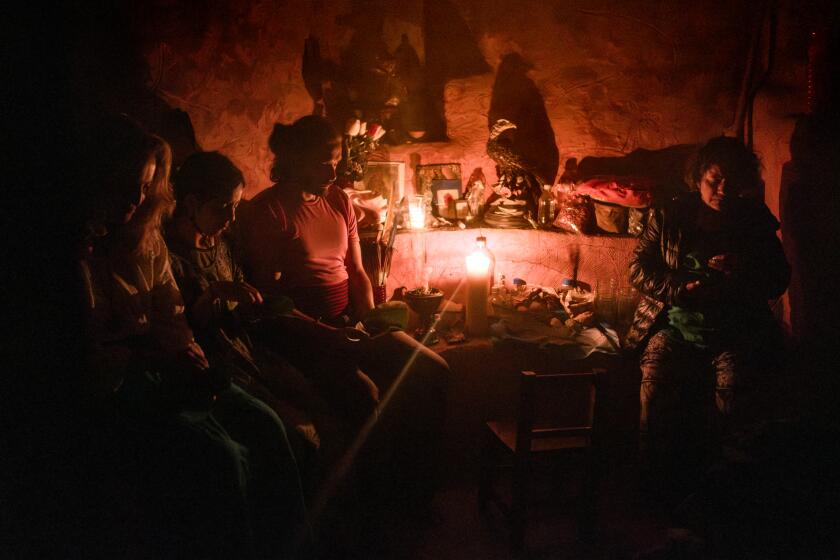Chill Persists Between Leaders of India, Pakistan
India and Pakistan say they still haven’t agreed to restart formal peace talks that broke down with bitter recriminations more than two years ago, despite a meeting Monday between their leaders that lasted just over an hour.
Officials stressed that the discussions between Indian Prime Minister Atal Behari Vajpayee and Pakistani President Pervez Musharraf, their first since a failed summit at the Indian town of Agra in July 2001, were a positive step toward resuming negotiations.
But, apparently wary of hard-liners in both countries who oppose major concessions over the disputed territory of Kashmir, Vajpayee and Musharraf said nothing publicly about what they discussed, or how much progress they made, at the presidential palace here.
“New questions have come up, and new answers are being sought,” Vajpayee told reporters in Urdu, Pakistan’s national language, before his meeting with Musharraf. He said those questions required “adequate representation in each other’s countries,” apparently meaning diplomats had more work to do before formal talks could begin.
“The two sides have to realize each other’s problems, and we have to find a way out together,” the Indian leader added.
India and Pakistan have clashed over control of Kashmir since 1947, when Britain granted independence to and partitioned the subcontinent. The neighbors have fought two of their three wars over the territory, and Pakistan-based militants seek independence for the Indian-controlled portion of Kashmir, or its merger with Pakistan.
Monday’s meeting between Musharraf and Vajpayee took place during a break from a conference of leaders from the South Asian Assn. for Regional Cooperation. The two were joined by several top officials from both countries, including India’s national security advisor, Brajesh Mishra, who had met with several unidentified Pakistani officials before Vajpayee agreed to the meeting.
Pakistan’s information minister, Sheik Rashid Ahmed, said the two leaders had detailed talks, including about Kashmir. He added that the talks were held “in a good atmosphere.”
But Indian Foreign Minister Yashwant Sinha, who spoke by phone with Secretary of State Colin L. Powell before coming to Islamabad with Mishra for preliminary talks Thursday, was more guarded.
“Both leaders welcomed the recent steps toward the normalization of relations between the two countries and expressed the hope that the process will continue,” Sinha told reporters.
Vajpayee is expected to call national elections for May, and any major decisions on Kashmir before then would risk alienating hard-line Hindu nationalists, whom Vajpayee, a moderate, counts on for crucial votes.
Refusing to disclose any details of Monday’s meeting, Sinha insisted there was too much at stake to make things public now.
Even the tentative signs of progress drew derision, and dire warnings, from Pakistan-based militant groups fighting India’s rule of part of Kashmir.
The largest group, the Hizbul Moujahedeen, called the Vajpayee-Musharraf meeting “a cosmetic effort to improve relations.” Peace initiatives between India and Pakistan won’t stop the “freedom struggle” in Kashmir, the group’s leader said in a phone interview.
A spokesman for the banned extremist group Jaish-e-Mohammed, which Pakistani investigators have linked to a failed attempt to assassinate Musharraf last month, accused Musharraf of “betraying Kashmiris.”
“He must remember Kashmiris can turn their back on Pakistan and launch a struggle for a separate homeland,” Khalil Ahmed Naqshbandi said.
At Agra in 2001, Musharraf sought to spell out “a structure for the process of future dialogue.” It would have been a framework for achieving peace between India and Pakistan. In the end, the leaders couldn’t even agree on a bland communique saying they had met and talked. Pakistani officials said they had clinched a deal with India that fell apart at the last minute.
Five months later, militants attacked India’s Parliament, killing nine people. Indian leaders blamed Pakistan, which denied involvement, and the nations barely avoided war.
Now Pakistan is pressing to revive the deal that appeared so close at Agra. But, in public at least, India has insisted that Pakistan first must stop “cross-border terrorism,” and then negotiations must start afresh.
Still, tensions have eased in recent months, and a series of confidence-building measures have helped create momentum toward formal negotiations. Air links between the countries have resumed, and the two sides are observing a cease-fire along the frontier that divides Kashmir.
More to Read
Sign up for Essential California
The most important California stories and recommendations in your inbox every morning.
You may occasionally receive promotional content from the Los Angeles Times.








